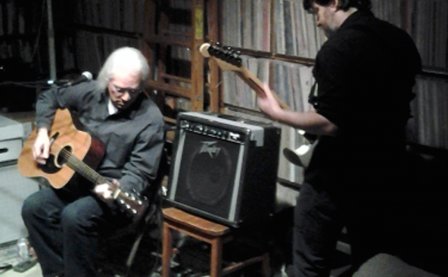In “New Weird America,” the controversial U.S. avant-rock scene-defining Wire article, David Keenan posits Dan Ireton, a.k.a. Dredd Foole, as a primary, if not the primary, influence on free-form musicians like Ben Chasny, Christina Carter, and Jack Rose. But Ireton’s catalogue, which stretches back more than two decades and includes solo albums and recordings with his rotating-cast band The Din, draws more broadly from the annals of rock than his associations with the Arthur set might lead you to believe. His voice – his most potent instrument – scrambles to the tremulous heights Tim Buckley reached in his most freaked albums, mutates into an atavistic proto-punk yowl (think Godz, Fugs, Stooges), and spills drops of Alan Wattsian philosophy (or, if you’re less generous, pseudo-philosophy) on the carpet through a lysergic drawl.
His choice of covers on this album is also revealing: his reinterpretation of Arthur Lee’s “Signed D.C.” gestures towards his love of classic rock, and his adaptation of J. Mascis’s “Someone Said” proves that he’s also at home with indie rock’s conventional side. And like Byron Coley, Ireton speaks in rock’s formative hipster dialect with a healthy self-awareness but without cheap irony or forced nostalgia. Dig his paean to Lee in this album’s booklet: “the 1st epistle o’ one a. lee / purchased in throes o’ puberty / oh how this one shook me.” Ireton’s tongue may be firmly in cheek, but his reverence is always sincere.
While Ireton pilfers liberally throughout Daze on the Mounts from the great simultaneous order that is rock history, the final product is highly idiosyncratic and very much his own. Originally released in 2004 on Matt Valentine’s Children of Microtones label, this record mates Ireton’s vocals with a swarm of warped and warbly stringed instruments and percussive devices played by Valentine and Erika Elder. Murky and at times amorphous, these songs meander and soar purposively in equal measure; if you have a short attention span, sit this one out. Similar sun-baked hues and let-it-flow vibes color and course through each piece. Often it sounds as if we’ve stumbled upon some lost Grateful Dead concert tape in which a strait-jacketed fuck-up storms the stage during “Dark Star” and drawls lunacies into the mic.
This isn’t to say, though, that these musicians’ wits have completely up and left. Some genuinely life-affirming songs rest on this disc. “The Lion of Green” finds Ireton bobbing in a sea of tamboura and hayseed electric guitar shimmer that wouldn’t sound out of place on one of Valentine and Elder’s recordings with The Bummer Road. In “Freedom,” the Mascis appropriation, Ireton sings and resings a simple lyric until all of its signifying capacities have been exhausted. Here, his repetitions and expansions recall the extended meditations on Coltrane’s Olé, an album that, incidentally, also weighs heavily on Christina Carter’s aesthetic.
Daze on the Mounts’ most redeeming quality -- the one that at least partially justifies its indulgences -- is its willful insistence on not appealing to very many people. Creative jazz musicians like William Parker and Paul Flaherty have expressed frustration at their music’s underexposure, repression, and ghetto-ization, arguing that impulses toward improvisation and exploration are innately human and are only perceived in other ways because of the corrupt powers that be. Ireton’s gnarled, esoteric ramblings, however, hearken back to rock’s storied junkies, drop-outs, and mavericks, characters like Iggy Pop whose roads not taken question humanist imperatives and even welcome self-annihilation. Still married, healthy, and musically active in his fifties, Ireton clearly hasn’t followed in his influences’ footsteps; even he seems unwilling to fully live out his aesthetic. But unsettling ideas seem suddenly alluring when we assume the role of the seedy outcast, and Ireton teaches us much about our darker nature by inhabiting these ragged skins. When he croons maniacally about freedom, he’s giving us an important lesson: there’s always been something subversive, violent, even unseemly about the yearning for life, liberty, and the pursuit of happiness.
More about: Dredd Foole


